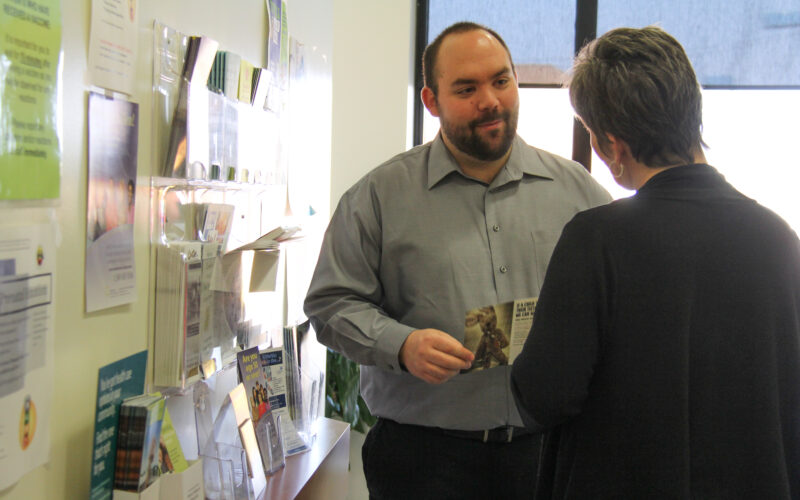The Too Often Forgotten – Addictions, Drugs and Mental Health (Marc Laferriere, @MarcLaferriere)
The issues I am addressing in this article have a devastating impact on this community. As a clinical social worker in Brantford, I have dealt with the victims of drugs, addiction, and abuse daily, and I have seen the damage these cause in our community.
According to the Canadian Centre for Substance Abuse, illicit drug use costs Canadian society an estimated $8.2 billion a year. Sixty per cent of those users fall between the ages of 15-24, and in some high-risk communities, kids as young as 11 are trying illicit drugs. Those disturbing statistics show the true reasons why we need a smarter and more effective strategy for treating drug-related offences, as well as issues surrounding addiction. Serious drug use and abuse is more and more becoming an issue with the youth of our community, and we need to focus our efforts on making sure that kids don’t fall victim to drugs.
We need to re-invest in programs that keep our kids from criminal activity, not eliminate the funding and the opportunities for redirection. We have to have effective programs in place that make sure our kids know the dangers of drugs and addiction at a young age. Many local agencies do great things in this regard and there is a lot of hope in our community regarding programs on the horizon. National Addictions Awareness Week is a great project to be involved in for this very reason. It’s a first step that I believe will lead to quite the path if it continues to be supported by the community. The sheer number of people who come out for events like this is astounding. This problem is big in Brantford, Brant, Six Nations and New Credit and the stories of addicts and their families are often gut-wrenching. Falling in with the wrong crowd, leaning towards drugs to cope with physical, mental or sexual trauma and the tales of what is lost from years of drug abuse are quite the reality check for those who are unfamiliar with the subject.
Part of our strategy for creating a tough and effective justice system here in Canada includes our approach to treating addictions. With treatment programming in place that all Canadians can access, we can rehabilitate those who are ready and help create positive stories of achievement and hope. Having to wait 9 months for 28 day treatment (if you are lucky) isn’t helping. Being shipped across the province isn’t as helpful as being able to be served in your community with your family by your side. We need more beds, and not just for adult addicts, but for youth. Youth are often caught between the programs for children and the programs for adults. Again, we are very much looking forward to what the incoming detox centre will bring to our community – and how it can create a positive ripple effect here. I’m also hoping the work being done for SHARC (Self-Help Addictions Resource Centre) will eventually be a great resource for recovery in our community.
Our current justice system places too much emphasis on punishing drug users and drug offenders, and not enough on addiction treatment. Yes, we do believe that criminals should be punished for breaking the law. However, we must continue to be sensitive to the fact that drugs can quickly become addictive, addiction is a disease and we need to do what we can to support the rehabilitation and reintegration of people in our community.
I have had occasion to talk with Howard Sapers office during some planning for a previous year’s Brantford/Brant Mental Health Week. Mr. Sapers is the Federal Ombudsman for prisons. He highlights often how we are criminalizing mental health issues and incarcerating mental health clients instead of treating them. It’s an expensive and backwards solution. We put a hold on building addiction treatment centres, and cut funding to mental health services and facilities, but build private prisons for unreported crime when the crime rate has been falling. “Criminalizing and then warehousing the mentally ill burdens our justice system and does nothing to improve public safety,” Sapers wrote in a very well researched annual report. We can’t let prisons become the dumping ground for the mentally ill. It’s immoral, it’s ineffective, it’s dangerous and it’s bloody expensive.
Mental health and addictions services are not just less expensive to run, but also save us money because they prevent future issues from occurring. Get an addict clean and working and s/he isn’t breaking into your house to steal your jewellery. S/he isn’t costing the taxpayer prison costs either. You do better and so does s/he. We all win with safer communities and less victims of crime and less victims of the system. We need to continue to work on a system of justice in this country that is both tough and effective on crime. That means punishing those who commit crime, working to prevent crime, rehabilitating those addicted to the perils of crime, and protecting those people who fall victim to crime. I hope you have found this series of articles enlightening. I have enjoyed hearing your comments on these issues and look forward to more discussion on it.
Crime isn’t going away, but we have a responsibility to treat complex issues like crime with critical thought. We have a moral obligation to push for better, more effective services. A fairer country and a safer country requires the input of many viewpoints. I’ve been happy to share views on this issue, please continue to share yours so that we can move forward together towards a safer country built from safer communities.
